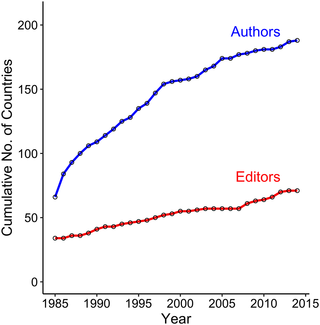当前位置:
X-MOL 学术
›
PLOS Biol.
›
论文详情
Our official English website, www.x-mol.net, welcomes your
feedback! (Note: you will need to create a separate account there.)
A persistent lack of international representation on editorial boards in environmental biology.
PLOS Biology ( IF 7.8 ) Pub Date : 2017-12-12 , DOI: 10.1371/journal.pbio.2002760 Johanna Espin 1, 2 , Sebastian Palmas 3 , Farah Carrasco-Rueda 4 , Kristina Riemer 5 , Pablo E Allen 6 , Nathan Berkebile 4 , Kirsten A Hecht 4, 7 , Kay Kastner-Wilcox 8 , Mauricio M Núñez-Regueiro 5 , Candice Prince 9 , Constanza Rios 4 , Erica Ross 3 , Bhagatveer Sangha 10 , Tia Tyler 9 , Judit Ungvari-Martin 7, 11 , Mariana Villegas 5 , Tara T Cataldo 12 , Emilio M Bruna 2, 5
PLOS Biology ( IF 7.8 ) Pub Date : 2017-12-12 , DOI: 10.1371/journal.pbio.2002760 Johanna Espin 1, 2 , Sebastian Palmas 3 , Farah Carrasco-Rueda 4 , Kristina Riemer 5 , Pablo E Allen 6 , Nathan Berkebile 4 , Kirsten A Hecht 4, 7 , Kay Kastner-Wilcox 8 , Mauricio M Núñez-Regueiro 5 , Candice Prince 9 , Constanza Rios 4 , Erica Ross 3 , Bhagatveer Sangha 10 , Tia Tyler 9 , Judit Ungvari-Martin 7, 11 , Mariana Villegas 5 , Tara T Cataldo 12 , Emilio M Bruna 2, 5
Affiliation

|
The scholars comprising journal editorial boards play a critical role in defining the trajectory of knowledge in their field. Nevertheless, studies of editorial board composition remain rare, especially those focusing on journals publishing research in the increasingly globalized fields of science, technology, engineering, and math (STEM). Using metrics for quantifying the diversity of ecological communities, we quantified international representation on the 1985-2014 editorial boards of 24 environmental biology journals. Over the course of 3 decades, there were 3,827 unique scientists based in 70 countries who served as editors. The size of the editorial community increased over time-the number of editors serving in 2014 was 4-fold greater than in 1985-as did the number of countries in which editors were based. Nevertheless, editors based outside the "Global North" (the group of economically developed countries with high per capita gross domestic product [GDP] that collectively concentrate most global wealth) were extremely rare. Furthermore, 67.18% of all editors were based in either the United States or the United Kingdom. Consequently, geographic diversity-already low in 1985-remained unchanged through 2014. We argue that this limited geographic diversity can detrimentally affect the creativity of scholarship published in journals, the progress and direction of research, the composition of the STEM workforce, and the development of science in Latin America, Africa, the Middle East, and much of Asia (i.e., the "Global South").
中文翻译:

持续缺乏国际环境生物学编辑委员会的代表。
由期刊编辑委员会组成的学者在定义其领域的知识轨迹方面起着至关重要的作用。尽管如此,对编辑委员会组成的研究仍然很少,尤其是那些侧重于在日益全球化的科学,技术,工程和数学(STEM)领域发表研究的期刊的研究。我们使用量化生态群落多样性的指标,对1985-2014年24种环境生物学期刊的编辑委员会中的国际代表性进行了量化。在过去的30年中,有7027个国家的3,827位独特的科学家担任过编辑。随着时间的流逝,编辑社区的规模不断扩大-2014年服务的编辑人数比1985年增加了4倍-编辑所在的国家数也有所增加。尽管如此,“全球北方”(人均国内生产总值[GDP]高,集中了全球大部分财富的经济发达国家集团)以外的编辑很少见。此外,所有编辑中有67.18%来自美国或英国。因此,地理多样性-1985年的低点-到2014年一直保持不变。我们认为,这种有限的地理多样性会不利地影响期刊上发表的奖学金的创造力,研究的进展和方向,STEM劳动力的组成以及发展拉丁美洲,非洲,中东和亚洲大部分地区(即“全球南方”)的科学博士学位。(人均国内生产总值[GDP]高的经济发达国家集中了全球大多数财富)。此外,所有编辑中有67.18%来自美国或英国。因此,地理多样性-1985年的低点-到2014年一直保持不变。我们认为,这种有限的地理多样性会不利地影响期刊上发表的奖学金的创造力,研究的进展和方向,STEM劳动力的组成以及发展拉丁美洲,非洲,中东和亚洲大部分地区(即“全球南方”)的科学博士学位。(人均国内生产总值[GDP]高的经济发达国家集中了全球大多数财富)。此外,所有编辑中有67.18%来自美国或英国。因此,地理多样性-1985年的低点-到2014年一直保持不变。我们认为,这种有限的地理多样性会不利地影响期刊上发表的奖学金的创造力,研究的进展和方向,STEM劳动力的组成以及发展拉丁美洲,非洲,中东和亚洲大部分地区(即“全球南方”)的科学博士学位。
更新日期:2017-12-31
中文翻译:

持续缺乏国际环境生物学编辑委员会的代表。
由期刊编辑委员会组成的学者在定义其领域的知识轨迹方面起着至关重要的作用。尽管如此,对编辑委员会组成的研究仍然很少,尤其是那些侧重于在日益全球化的科学,技术,工程和数学(STEM)领域发表研究的期刊的研究。我们使用量化生态群落多样性的指标,对1985-2014年24种环境生物学期刊的编辑委员会中的国际代表性进行了量化。在过去的30年中,有7027个国家的3,827位独特的科学家担任过编辑。随着时间的流逝,编辑社区的规模不断扩大-2014年服务的编辑人数比1985年增加了4倍-编辑所在的国家数也有所增加。尽管如此,“全球北方”(人均国内生产总值[GDP]高,集中了全球大部分财富的经济发达国家集团)以外的编辑很少见。此外,所有编辑中有67.18%来自美国或英国。因此,地理多样性-1985年的低点-到2014年一直保持不变。我们认为,这种有限的地理多样性会不利地影响期刊上发表的奖学金的创造力,研究的进展和方向,STEM劳动力的组成以及发展拉丁美洲,非洲,中东和亚洲大部分地区(即“全球南方”)的科学博士学位。(人均国内生产总值[GDP]高的经济发达国家集中了全球大多数财富)。此外,所有编辑中有67.18%来自美国或英国。因此,地理多样性-1985年的低点-到2014年一直保持不变。我们认为,这种有限的地理多样性会不利地影响期刊上发表的奖学金的创造力,研究的进展和方向,STEM劳动力的组成以及发展拉丁美洲,非洲,中东和亚洲大部分地区(即“全球南方”)的科学博士学位。(人均国内生产总值[GDP]高的经济发达国家集中了全球大多数财富)。此外,所有编辑中有67.18%来自美国或英国。因此,地理多样性-1985年的低点-到2014年一直保持不变。我们认为,这种有限的地理多样性会不利地影响期刊上发表的奖学金的创造力,研究的进展和方向,STEM劳动力的组成以及发展拉丁美洲,非洲,中东和亚洲大部分地区(即“全球南方”)的科学博士学位。











































 京公网安备 11010802027423号
京公网安备 11010802027423号